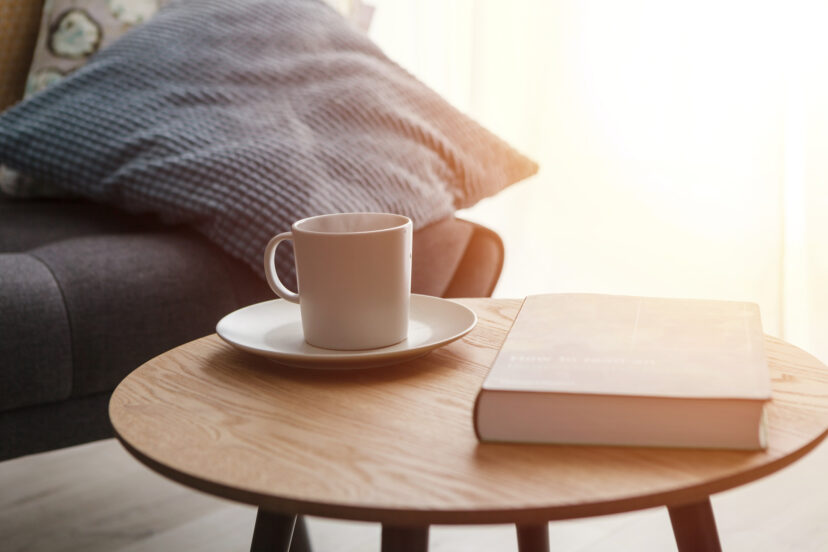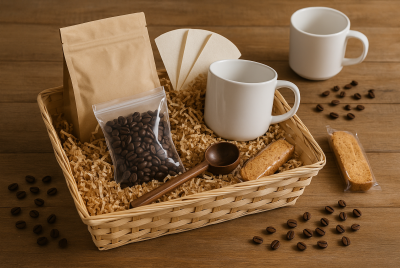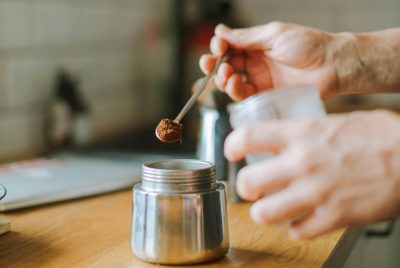Organic Coffee Table: Sustainable, Stylish, and Functional
We may earn a commission for purchases made using our links. Please see our disclosure to learn more.
Let’s face it, most coffee tables on the market are either too generic or made from unsustainable materials that’s harmful to the planet. It would be nice to find a coffee table that’s functional, stylish, and one that aligns with your sustainable values. An organic coffee table offers just that! In this guide, you’ll learn everything you should know about these eco-friendly beauties plus some products to consider. Ready to discover a coffee table that tells a story? Let’s begin.
What is an Organic Coffee Table?
An organic coffee table has a natural (or free) shape that’s quite different from the standard shapes (like circle, oval, or rectangular tables). These tables are crafted from materials that respect nature—sustainable, natural, and free from harmful chemicals. Mass-produced furniture often relies on synthetic components but organic coffee tables? They’re made from wood, bamboo, rattan, and natural stone. Each piece carries a sense of authenticity, blending rustic charm with modern design. The beauty of an organic coffee table lies in its uniqueness—no two are ever quite the same.
Why Choose an Organic Coffee Table?
1. Eco-Friendly and Sustainable
Most of us don’t think twice about where our furniture comes from or whatever it’s made of, right? Truth is, we’re quick to buy items that “look good”. However, in reality, traditional manufacturing often means deforestation, pollution, and waste. That said, going for organic coffee tables is a wiser, practical choice. They use materials that are responsibly sourced or repurposed, reducing environmental harm. The question is, are you willing to make a responsible choice?
2. Unique and One-of-a-Kind
Since these eco-friendly tables have natural or free shape, they look like a masterpiece in itself. That’s why I love them!!! Each of them are unique and one-of-a-kind. The grain of reclaimed wood, the veins in a slab of marble, the curves of a live edge—they each tell a different story. Guess what, your coffee itself can be a conversation starter, perfect for coffee chat!
3. Healthier Indoor Environment
Mass-produced furniture often contains chemicals like formaldehyde, which can seep into the air you breathe. Organic coffee tables skip the toxins, relying on natural finishes that keep your home safe. Think of it as a breath of fresh air—literally.
4. Timeless Aesthetic Appeal
Nature never goes out of style, but trends do, that’s for sure. Organic coffee tables bring warmth, texture, and an inviting atmosphere to any room. Whether your home leans toward minimalism, bohemian charm, or rustic elegance, there’s a table that fits seamlessly into your space.
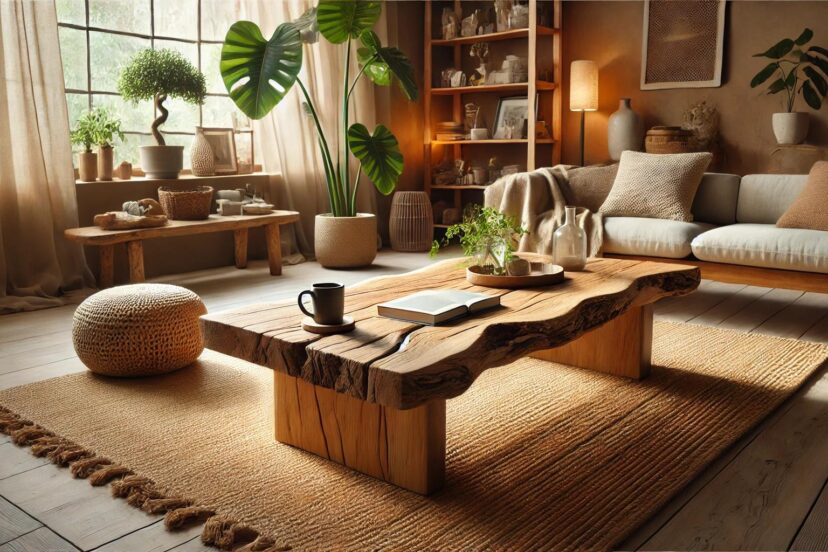
Best Materials for an Organic Coffee Table
1. Reclaimed Wood
There’s something deeply poetic about giving old wood new life. Salvaged from barns, factories, or ships, reclaimed wood carries history in every knot and grain. Not only is it durable, but it also reduces the demand for freshly cut trees, making it both practical and responsible.
2. Bamboo
Fast-growing, lightweight, and incredibly sturdy, bamboo is the overachiever of the sustainable world. Its sleek texture and natural strength make it perfect for modern designs, proving that sustainability doesn’t mean sacrificing style.
3. Rattan or Wicker
If you’re drawn to coastal or bohemian vibes, rattan and wicker are your best friends. They offer an airy, woven texture that brings an effortless charm to any living space while remaining eco-friendly and durable.
4. Live Edge Wood
Live edge tables preserve the natural curves of the tree, celebrating its raw beauty rather than hiding it behind straight cuts. Each table feels like a piece of the forest itself—wild, unpolished, and stunning.
5. Stone (Marble or Granite)
While we often think of organic furniture as wood-based, stone tables have their own natural magic. Marble and granite offer durability with a refined touch, making them perfect for those who want sustainability with a side of luxury.
Recommended Organic Coffee Tables
Here are some of the best eco-friendly and sustainable coffee tables available:
- Farmhouse Wood Coffee Table – A rustic yet modern coffee table made from eco-friendly reclaimed wood.
- WELLAND Natural Edge Coffee Table – A sleek, minimalist design crafted from 100% sustainable wood, featuring a beautiful live-edge finish.
- Giantex Boho Rattan Coffee Table – A stylish rattan coffee table perfect for adding a touch of organic, boho charm to your living room.
- East at Main Coffee Table – An industrial-style table made with responsibly sourced natural materials, blending rustic and contemporary aesthetics.
- VaeFae Bamboo Coffee Table – A sturdy, handcrafted bamboo table with added storage space, making it both functional and environmentally friendly.
These tables are excellent choices for creating a sustainable and stylish living space! 🌿✨
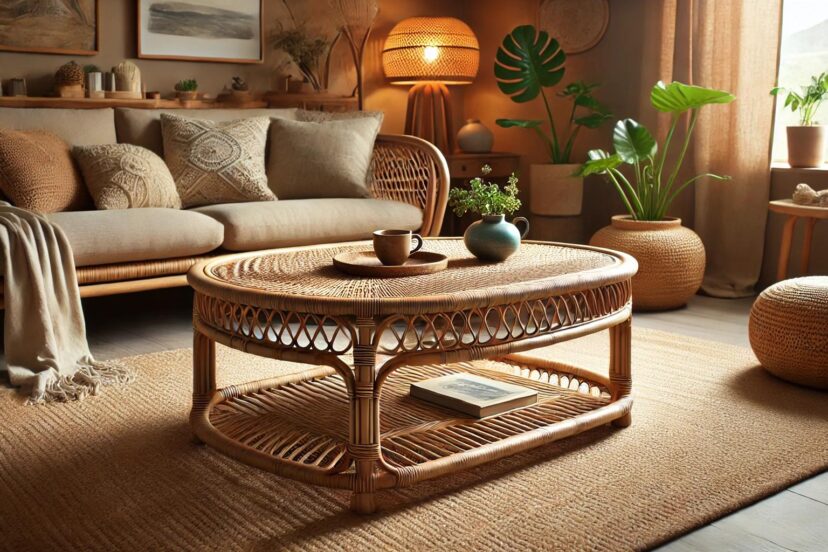
Choosing the Right Organic Coffee Table for Your Space
Consider the Size
A coffee table should complement your seating area, not overwhelm it. Try to look for coffee tables that are about two-thirds of your sofa’s length. Measure twice, buy once—that’s the golden rule.
Match Your Style
Are you drawn to sleek, modern aesthetics? A polished bamboo table might be your perfect match. Prefer something with a little more character? Reclaimed wood with metal accents can add that lived-in charm. Your table should feel like an extension of your personality.
Functionality Matters
Think beyond looks—what do you actually need from your coffee table? If you love storage, find one with shelves or hidden compartments. If you prefer simplicity, a minimalist live edge slab could be the perfect understated addition. Check out this article on coffee organizers to keep your coffee station clean and green.
How To Style An Organic Coffee Table
1. Keep It Simple
Resist the urge to overcrowd. A thoughtfully placed plant, a stack of books, and a well-chosen decorative piece can make all the difference without overwhelming the space.
2. Use Natural Elements
Enhance the organic look by incorporating wooden trays, ceramic vases, or woven baskets. These small details can create a cohesive and inviting setup.
3. Play with Heights
Visual interest comes from contrast. Pair a tall vase with a short candle holder or mix a small stack of books with a statement bowl. The key is balance.
4. Incorporate Greenery
Nothing breathes life into a room quite like plants. A small potted succulent or a fresh bouquet can make your coffee table feel vibrant and alive.
How to Maintain Your Organic Coffee Table
1. Clean Regularly
You’ll need to use a soft, damp cloth for wiping and cleaning your coffee table. Avoid harsh chemicals that can strip natural materials of their beauty.
2. Protect Against Spills
Coasters aren’t just for show—they prevent water rings and heat damage, helping your table age gracefully.
3. Reapply Natural Oils
Wood needs nourishment too. An occasional rub-down with linseed or coconut oil can keep it looking rich and polished.
4. Avoid Direct Sunlight
Too much exposure can cause fading, especially for wood and rattan pieces. If your table sits near a window, consider using light-filtering curtains to protect it.
DIY Organic Coffee Table Ideas
1. Pallet Coffee Table – Upcycle old wooden pallets for a rustic, budget-friendly creation.
2. Live Edge Slab Table – Find a beautiful wood slab, attach legs, and voila—you’ve got an artisanal masterpiece.
3. Bamboo Frame Table – Lightweight yet durable, bamboo poles can create a stunning, eco-friendly base.
4. Upcycled Tree Stump Table – Sanding and sealing a tree stump can turn it into a charming, natural coffee table.
Sustainable Furniture Design and Environmental Impact
Sustainability in furniture design is crucial for reducing environmental harm. A study published in Sustainability highlights how recycling furniture materials significantly lowers global warming potential compared to landfill disposal. It emphasizes the need for eco-friendly materials and sustainable practices in manufacturing. Additionally, research on Sustainable Design in the Furniture Industry explores how integrating environmental considerations in furniture projects can minimize ecological impact. By adopting sustainable practices, furniture makers can create products that are both stylish and environmentally responsible. Read more about Designing Environmentally Sustainable Furniture Products to learn about strategies for greener furniture production.
Conclusion
An organic coffee table isn’t just a piece of furniture—it’s a philosophy. It represents sustainability, craftsmanship, and a love for natural beauty. Whether you buy one from a skilled artisan or craft your own, it’s a choice that brings warmth, style, and responsibility into your home. Why settle for ordinary when you can have something truly meaningful?
FAQs
1. What makes a coffee table organic?
It’s crafted from natural, sustainable, and non-toxic materials like reclaimed wood, bamboo, rattan, or stone—free from synthetic finishes and harmful chemicals.
2. Are organic coffee tables expensive?
Prices vary, but they’re often comparable to high-end mass-produced furniture. DIY or artisan-made options can be more affordable and unique.
3. How do I maintain a reclaimed wood coffee table?
Dust regularly, use coasters to prevent stains, and apply natural wood oil occasionally to keep it looking fresh.
4. Can I customize an organic coffee table?
Yes! Many artisans offer custom designs, and DIY projects allow you to create a table that perfectly fits your style.
5. Are bamboo coffee tables durable?
Definitely! Bamboo is stronger than some hardwoods, resists scratches, and lasts for years when properly sealed.

